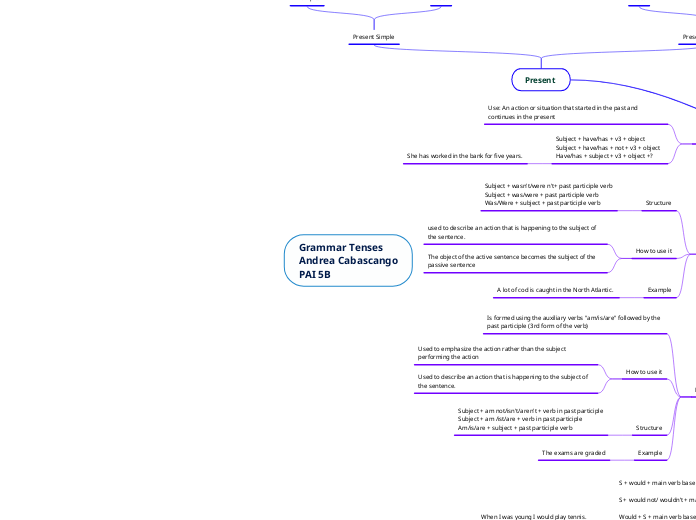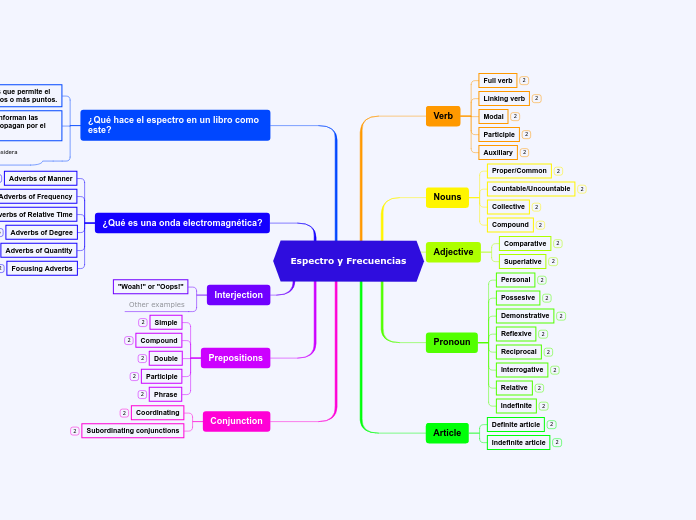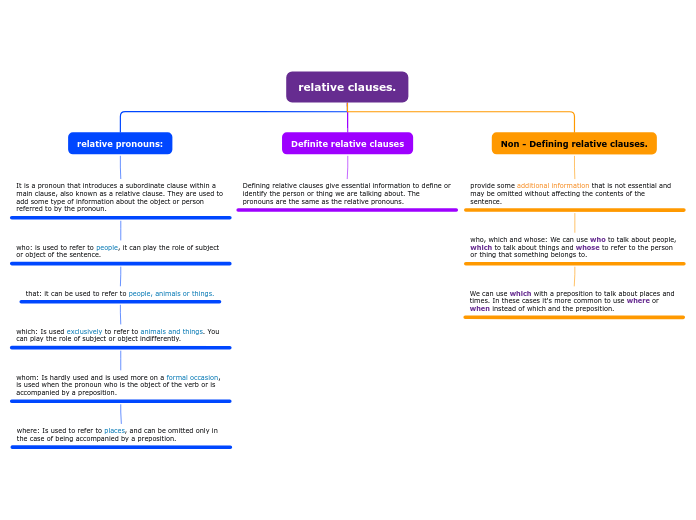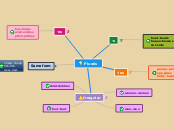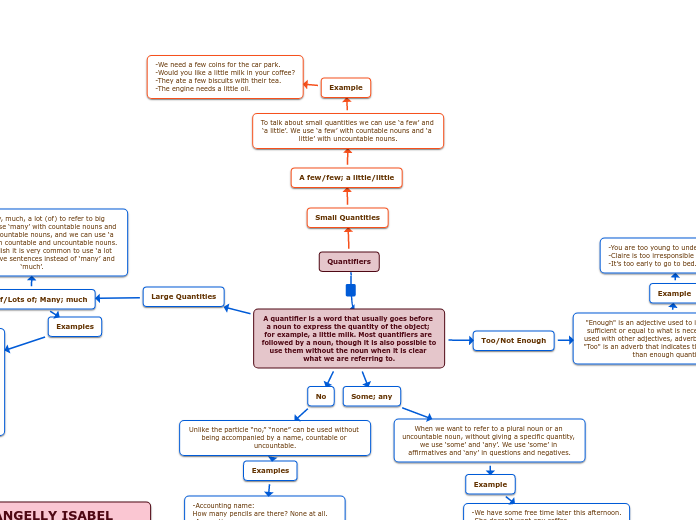Grammar Tenses
Andrea Cabascango
MYP 5B
Past tenses B2
Infinitive and Gerund (ing)
Uses:
change the meaning
Stop watching the news.
Infinitive and Gerund - gerund
S + verb + to + verb inf + cmp + .
She's learning to play the piano in her school.
Infinitive and Gerund - infinitive
S + verb + verb -ing + cmp + .
I don't mind waiting if you're busy.
Used to
S + used to + inf. verb .
S + didn’t/did not + use to + m. verb
Did/Didn’t + use to + m. verb
We used to go to the seaside every summer when I was a kid.
Past simple
subject + verb + ed
subject + did not + infinitive
Did + subject+ infinitive
John Cabot sailed to America in 1498.
Past continous
S + was/were + verb (ing) + object
S + was/were + not + verb (ing) + object
Was/were + S + verb (ing) + object?
They were eating at the restaurant.
Past perfect
S + had + verb (past participle) +complement
S + had + not + verb (past participle) +complement
Had + S + verb (past participle) + complement?
The film had started before we arrived.
Past perfect continous
S + had + been + v-ing + .
S+ had not/hadn´t + been + v-ing + .
Had + S + been + v-ing + ?
Helen had been listening the same music for 4 hours.
Would
S + would + main verb base + .
S+ would not/ wouldn’t + main verb base + .
Would + S + main verb base + ?
When I was young I would play tennis.
Tenses
Passive present
The exams are graded
Subject + am not/isn't/aren't + verb in past participle
Subject + am /ist/are + verb in past participle
Am/is/are + subject + past participle verb
Used to describe an action that is happening to the subject of the sentence.
Used to emphasize the action rather than the subject performing the action
Is formed using the auxiliary verbs "am/is/are" followed by the past participle (3rd form of the verb)
Passive past
A lot of cod is caught in the North Atlantic.
How to use it
The object of the active sentence becomes the subject of the passive sentence
used to describe an action that is happening to the subject of the sentence.
Subject + wasn't/were n't+ past participle verb
Subject + was/were + past participle verb
Was/Were + subject + past participle verb
Present perfect
Subject + have/has + v3 + object
Subject + have/has + not + v3 + object
Have/has + subject + v3 + object +?
She has worked in the bank for five years.
Use: An action or situation that started in the past and continues in the present
Present
Present Continous
This man is drinking tea
used for actions or events that are happening
or developing now.
+: S + am/is/are + present participle (verb+ing) +compliement
-: S + am/is/are + not + present participle (verb+ing) + complement
?: Am/is/are + s + present participle (verb+ing) + complement
Present Simple
Use:
used to refer to events, actions, and
conditions that are happening all the time
+: S + Verb in the base form/third person
plural form
-: S + Do not/Don’t/Does not/Doesn’t + Verb in the base form/third person plural form
?: Do/Does + Subject + Verb
She works in London
Conditional
"I wish" + a condition when we regret something.
After the words "I wish" we put the part of the
complex sentence that goes after "if" in
the conditionals.
B2 Future Forms
Future perfect continous
Actions that will be ongoing before another action in the future.
I will have been playing tennis.
+: S + will + have + been + present participle of the main verb + compliment
-: S + will + not + have +been + present participle of the main verb + compliment
?: Will + S + have + been + present participle of the main verb + compliment
Future perfect
Actions that will be completed before
another action in the future.
Example:
I will have played tennis.
+: S + will + have + past participle + compliment
-: S + will + not + have + past participle + compliment
?: Will + S + have + past participle + compliment
Future Continous
Actions that will be ongoing in the future.
I will be playing tennis.
Structure
+: S + will + be + Past participle form of the verb + compliment
-: S + Will not be/Won’t be + Past participle form of the verb + compliment
?: Will + S + Be + Past participle form of the verb + compliment
Simple Future
Actions that will occur in the future.
Structure:
+: S + will + Base form of the verb + compliment
-: S + Will not/Won't + Base form of the verb + compliment
I will play tennis.
B2 Future forms 2
Determiners
Definite and indefinite articles
The moon looks beautiful tonight.
Demonstrative determiners
I don’t want to sit at this table. I want that table near the window.
Possessive determiners
Penelope brought her cat to the vet.
Determiners of difference
Other shoes might match your outfit better.
Can I have another cup of tea?
Numbers
Cardinal numbers|I’m close with my four siblings.
Each employee was given a raise.
Distributive determiners
Interrogative determiners
What height is the Empire State Building?
Quantifiers
here are already several people waiting for a table at this restaurant.
a word that modifies, describes, or introduces a noun.
Pronouns
words that replace nouns to make sentences less repetitive and more concise
Indefinited
everyone, nobody
Interrogative
who, what
Reflexive
myself, herself
Demostrative
this, that
Possesive
his, her
Personal
he, she
Nouns
a noun is a term used to identify something
Types o nouns:
Proper
London
Commom
Table
Collective
Group
Abstract
Love
Concret
Apple
Un countable
Bread
Countable
Pens
Plural
Dogs
Singular
Dog
Articles
small words that help us to specify the nouns.
Uses:
"The" is used to specify a particular noun.
“A” is used before nouns that begin with a consonant sound.
A car
Subtopic
“An" is used before nouns that begin with a vowel sound.
An apple
The book on the table
Modals - imperatives
Imperatives
a sentence that expresses a direct command,
request, invitations, warning, or instruction.
Negative Imperative
Don't forget to call me.
Request
Please pass the salt
Command
Close the door
Modal
are auxiliary verbs that are used together with
main verbs to represent
ability, possibility and probability
subject to perform an action and to
emphasize the necessity of an action.
the speaker tries to explain:
Necessary
Advisable
Permissible
Possible
Probable
Expressing necessity
Have to
Have got to --------->Must
Be supposed to -------->had better
Be going to -------->will / shall
Be able to ------->can / could
Expressing necessity 0.2
i) Present
Must
Have to
Have got to
ii) Past
Had to
Lack of necessity and prohibition
i) Lack of necessity
Not have to
ii) Prohibition
Must not
Musn't
Advisability
should / shuoldn't
Ought to / no negative
had better / had better not
Should have + V past + participl
Relative adverbs
They provide more information
Connect the relative clause to the
main clause.
Types
Where
Refers to a place
The house where I grew up is
now a museum.
Why
Talk about reasons
Tell me the story of why you
decided to move.
When
Refers to a time
The day when we met was
unforgettable.
Relative clauses
is a type of dependent clause that
modifies a noun and provides more
information about it.
A relative clause has a subject and verb,
but it cannot stand alone as a sentence.
Non-defining Clauses
Extra information
use commas around them
always use a relative pronoun
Never use THAT
Defining clauses
Essential information
NOT use commas
subject after the pronoun,
Relative pronouns
a word that is used to connect an
independent
clause to a relative clause
include who, whom, whose, that
and which
meant to provide more information
about the subject it relates to
Example
Sheela, who is a teacher, also works as a social worker
Grammar Tenses
Andrea Cabascango
PAI 5B
